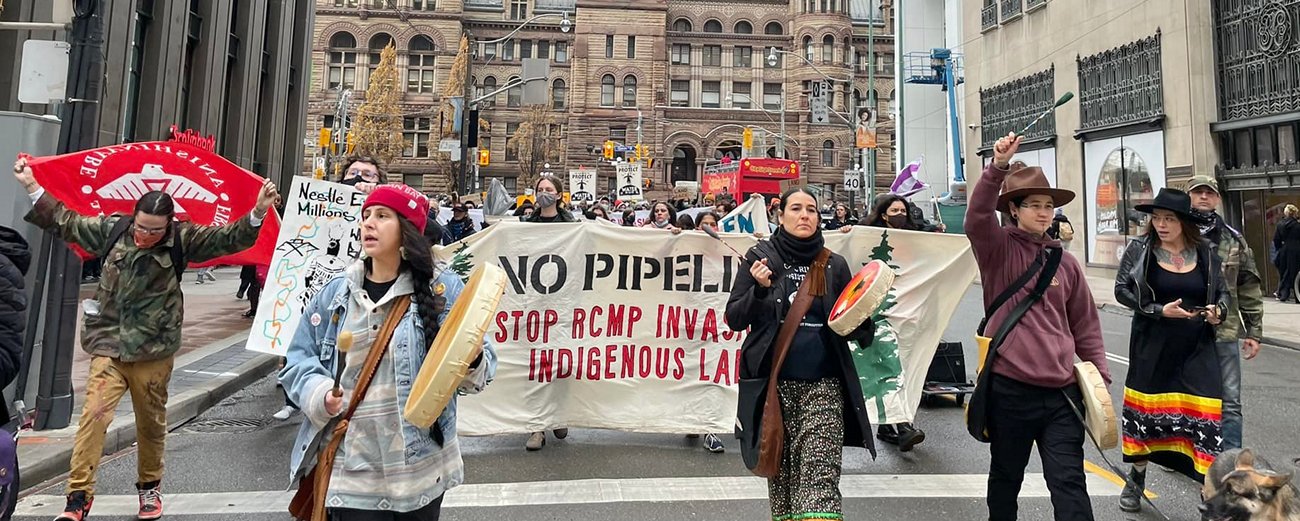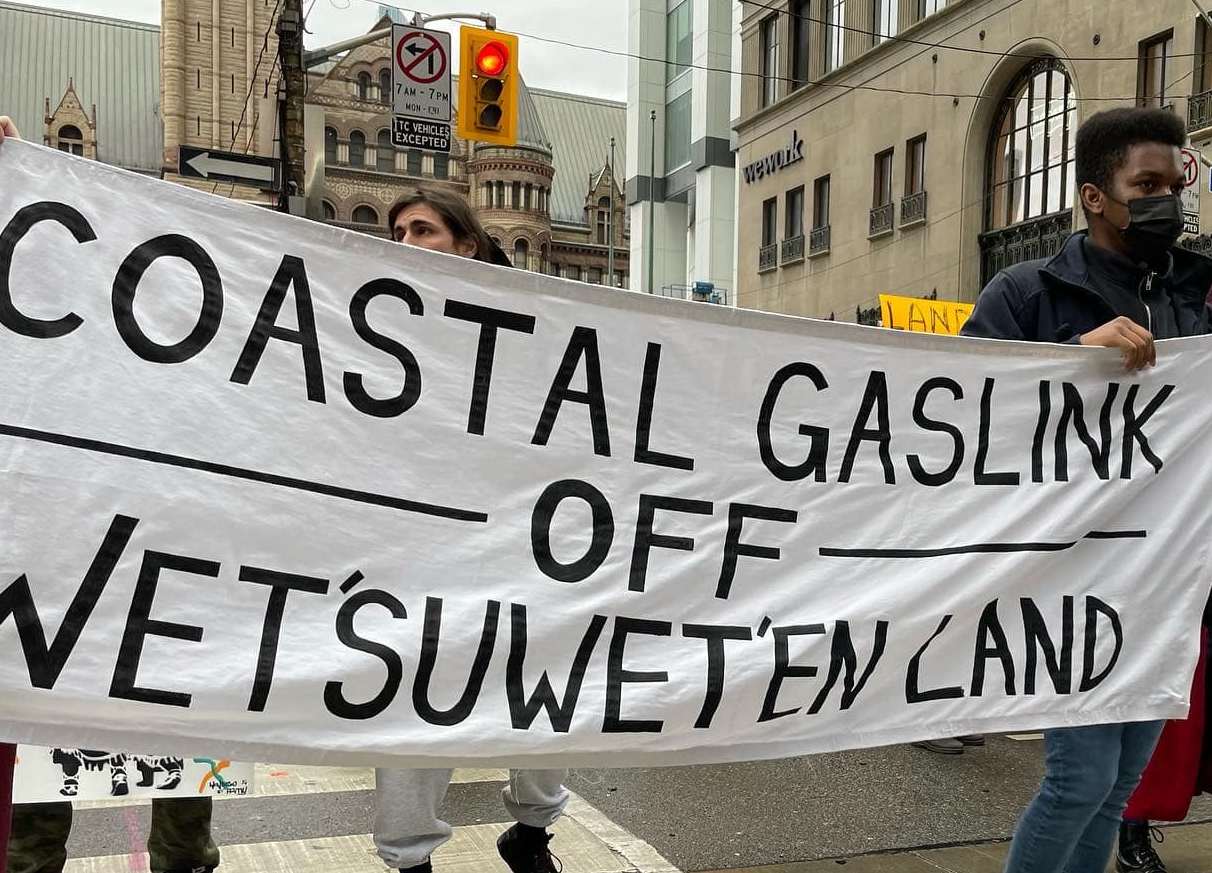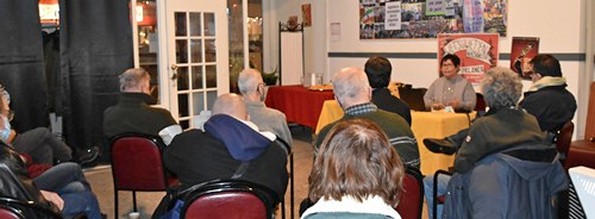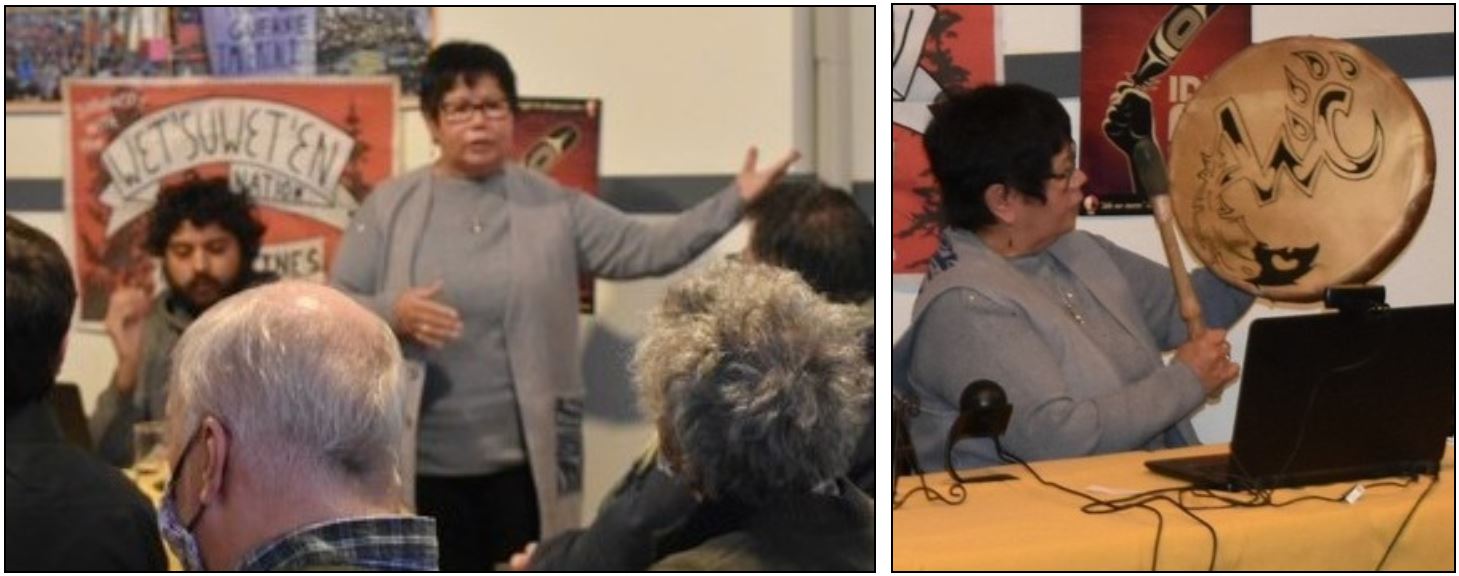
No. 80December 16, 2021
|
All Out Support for the Wet’suwet’en and Those Fighting Against Climate Change!
A Conversation with Marlene Hale
– Diane Johnston –
A conversation took place on the evening of December 10 with Marlene Hale, an activist and elder from the Likhsilyu clan of the Wet’suwet’en Nation. The meeting was held in Montreal with participants on site as well as taking part virtually. Youth fighting for universities to divest from fossil fuel companies, environmentalists, the leaders of the Green Party and the Marxist-Leninist Party in Quebec, union representatives both active and retired, along with industrial and transportation, health care, social service and education workers were in attendance.

She began the conversation by evoking the struggle of her people against Coastal GasLink at the Gidimt’en Checkpoint camp on January 8, 2019, when around 130 RCMP officers were deployed to arrest 14 people.
Marlene is also involved in the struggle to conserve the Old Growth Forest at Fairy Creek on Vancouver Island, where Native elders and activists, including seniors and youth on the front lines, have been fighting to prevent the forest from being logged by the Teal-Jones Group. They also face regular RCMP incursions and brutality targeting the youth.
She began her presentation by turning to the most recent events that have taken place on her nation’s territory, where helicopters, dogs and snipers with guns pointed at us with “their finger on the trigger” were used to remove land and water defenders. “Where we stand today is no different than on January 8, 2019,” she said, adding that the situation they are facing has gotten even worse. “There is no respect with regard to the RCMP impeding on our territory.” She likened the situation facing the Wet’suwet’en to that of other Indigenous peoples across Canada, such as with 1492 Land Back Lane, as well as the struggle of Quebec’s First Nations.
“Nothing is peaceful when it comes to the RCMP and their powers,” Marlene said, recalling that the worst day of all was August 9, when the police violently assaulted activists blocking access to the old growth at Fairy Creek. The youth there had their masks removed by the RCMP, who sprayed pepper-spray directly into their eyes and mouths during one of the hottest days of the year, then confined many inside vehicles for hours without any access to water.
When it comes to the courts and to the government, she said, “there is nothing any more. The mainstream media has just turned a blind eye to everything presently taking place.” Referring to the RCMP she said: “They have again come into Wet’suwet’en territory.” Marlene also put the lie to media reports that it’s a provincial problem. “It’s not a provincial problem!” she stated. “We are Indigenous, we’re the First Peoples. This is our land.”
Participants Join the Discussion
One of the participants asked a question about the different tactics being used by activists in the two struggles. Marlene explained that both struggles are interrelated, giving the example of climate change. She pointed to the fact that recent landslides in BC are associated with clear-cutting, such as at Fairy Creek. She noted the irrationality of building a pipeline under the Morice River that provides drinking water for the Wet’suwet’en and supports the fish and animals and the land.
Another commented that what struck him was the clash of cultures, where on the one hand “you have the Wet’suwet’en saying ‘this is our sovereign land,’ and on the other the RCMP, trained in colonialism, saying: “Are you going to come out peacefully or do we have to get you out?”
For the RCMP, he noted, “upholding your culture and your right to be is violent. That is the culture of the oppressor.” In his view, he said, there can be no resolution of the problem “unless there are nation-to-nation relations, which include upholding your right, your culture, the way you define it.” He added that the colonialist mentality does not start with recognizing and upholding that this is your sovereign right. “So what we say about colonialism is not just an abstraction.” He stressed the importance of supporting the First Nations and their sovereign right to be, which includes their veto over activities carried out on their territories. “Only then,” he stressed, “can any resolution take place.”
Marlene likened the most recent invasion by the RCMP of Wet’suwet’en territory to that of going home and being greeted by a bunch of assault rifles. “You can’t go home. You can’t turn the key in your own door and you cannot walk in. It’s no longer your home. You have no right and you have no title. … We have this rifle and that speaks to both communities.” She then noted that no one in government “is saying no to that rifle and that’s where it’s got to stop.”
Another person commented that what has really become clear is the “real problem” we are confronted with. He recounted that last May, with the discovery of the unmarked graves holding the remains of thousands of Indigenous children, all the elected politicians expressed shock. He noted that at that time they were all “exclaiming that something had to be done and that there had to be reconciliation.” However, five months later, the RCMP attacked the Wet’suwet’en people. It made him wonder where all the politicians were now. “Back then they wanted the land. That’s why they worked out this plan to get rid of the kids and ‘take the Indian out of the child,'” he said. Their silence today, he continued, makes one think that the reason they’re not going to say anything is because if they get into power, they’re going to do the same thing, so they don’t want to be put on the spot. This is what we’re facing as Canadians with these politicians who are just completely bankrupt.”
Another person stressed that “there is a turning point in the consciousness of Canadians standing together with First Nations peoples, in standing for the rights of all. Having the consciousness about the laws of the Indigenous peoples, I think among young people, you see that.” Noting that the Canadian state is colonial and that the RCMP was formed to suppress the Indigenous peoples, he said he felt “the strength that is gathering of the movement itself of Indigenous peoples and the Canadian and Quebec peoples together, fighting for the rights of Indigenous peoples in the context of fighting for the rights of all.” With regard to the fight for Indigenous rights, he added that “we need to change the constitution of this country. It’s a colonial constitution and that work really belongs to the First Nations, the people of Quebec and the rest of us on Turtle Island.”
A McGill University student, active with Divest McGill, informed participants about the years-long struggle and ongoing fight being waged by students to get the university to stop investing McGill’s endowment fund in fossil fuels.
The meeting concluded with everyone feeling inspired by the courage and determination of the Wet’suwet’en and other First Nations in defending their rights and in protecting Mother Earth. They also recognize the growing consciousness of Canadians and Quebeckers with regard to the struggles of First Nations against colonialism and in defence of their right to be and see that fight as part and parcel of their own struggle in defence of the rights of all and of their right to determine their own destiny. They also recognize the necessity of broadening that struggle so that human beings finally occupy centre-stage. Together, it can be done!
Militant Action in Toronto Supports Wet’suwet’en Land Defenders

A militant rally and march took place in Toronto on December 11, part of ongoing actions to stand with the Wet’suwet’en land defenders who are facing the most brutal state violence and terror at the hands of the RCMP as they fight to stop the Coastal GasLink (CGL) pipeline being forced through their territory.
 More than 300 people participated in the event which included speeches from Indigenous activists who shared their experiences of the struggles for their rights against the racist colonial Canadian state and its governments.
More than 300 people participated in the event which included speeches from Indigenous activists who shared their experiences of the struggles for their rights against the racist colonial Canadian state and its governments.
One of the main themes of the rally was the growing resistance being waged by Indigenous peoples across the land for their rights and sovereignty and the unity between Canadians and Indigenous peoples. Speakers pointed out that Indigenous peoples and Canadians are one, facing the same racist state which violates the rights of all. The rally participants joined in denouncing the actions of governments and courts at all levels which violate the rights of Indigenous peoples while enforcing the private interests of resource monopolies and their funders such as TD Bank, Royal Bank of Canada, the Canada Pension Plan and others.
A number of the speakers pointed out that the fight being waged by the Haudenosaunee and the Wet’suwet’en and other Indigenous peoples is creating “uncertainty” for all private interests and their funders involved in resource extraction or building pipelines on Indigenous lands in violation of Indigenous law and without consent. This “uncertainty” will continue to grow, they said, as the Indigenous peoples and their allies stand together against the lies and violence of the Canadian state and its police whose aim is to create “certainty” for private interests by any means.

Of note were the reports given by Mohawk land defenders Layla Staats and Skyler Williams of Six Nations who travelled to the Yintah to stand with the Wet’suwet’en land defenders. Staats in particular described the Gestapo-like tactics of the RCMP against the land defenders and their allies. This included coming at the land defenders in military formation, with attack dogs, pointing assault rifles at unarmed men and women and elders, violent arrests and beating up land defenders. Staats spoke about being forcefully arrested and of the efforts to dehumanize her and others. From the time they were arrested till they appeared in court they faced constant efforts to break down their spirits, such as forcing them to appear before the judge in their underclothing, and other psychological warfare tactics.
To the cheering of the participants, Layla Staats said that her spirit and the spirit of the others remain unbroken because their cause is just. Skyler Williams highlighted the advances made as a consequence of the broad unity of the people in the struggle and the social love between Indigenous peoples and their Canadian allies.
Following the rally at Toronto City Hall, the participants marched to Bay Street, stopping at intersections and in front of bank offices to chant slogans and call for ending the funding of the CGL pipeline. The march ended with spirited chanting outside the corporate offices of TC Energy, the owner of the CGL pipeline.
(Photos: Rising Tide Toronto)
Week of Actions to Stand with the Wet’suwet’en!Defund Coastal GasLink
Calendar of Events |
Demand that McGill University Divest from CGL Pipeline

 On December 1, McGill students held an action to protest the Canadian state’s violent repression of Wet’suwet’en Indigenous land defenders who are demanding an end to the construction of the Coastal GasLink (CGL) pipeline on their unceded territory, and an end to its support by the Canadian state including militarized RCMP attacks to remove land defenders from their territory.
On December 1, McGill students held an action to protest the Canadian state’s violent repression of Wet’suwet’en Indigenous land defenders who are demanding an end to the construction of the Coastal GasLink (CGL) pipeline on their unceded territory, and an end to its support by the Canadian state including militarized RCMP attacks to remove land defenders from their territory.
McGill University has invested $4,770,450 in TC Energy Corp as part of its endowment portfolio. McGill is investing directly in the construction of the CGL pipeline on Wet’suwet’en lands.
The event was co-hosted by Divest McGill, Indigenous Student Alliance, with support from CKUT 90.3FM, QPIRG/GRIP McGill, Students in Solidarity for Palestinian Human Rights McGill – SPHR McGill, Divest for Human Rights Campaign at McGill, McGill Nurses for Planetary Health and the Black Students’ Network of McGill.
The petition below was delivered to the McGill administration demanding that the university divest from TC Energy.
Petition Urging McGill University to Divest from TC Energy Corporation

Tiohtià:ke, Montréal, May 2021
This is an urgent appeal to immediately respond to the persisting crisis of colonial injustice being directed at the Wet’suwet’en Nation in the context of the push by TC Energy Corporation to construct the environmentally destructive $6.2-billion Coastal GasLink Pipeline against the collective wishes of the Wet’suwet’en people.
Today, McGill University holds significant endowment investments in the Coastal GasLink Pipeline, and this is unacceptable. This must change. Right now, McGill University holds an investment of $4,770,450 in TC Energy Corp as part of its endowment portfolio.[1] This investment in a colonial and environmentally destructive pipeline must stop right now.
Read additional details within an open letter on this subject published in The McGill Daily. [2]
It must be made clear that by investing in the TC Energy Corp stock, McGill is not only directly funding a project which violates Indigenous human rights, but also delivers a social licence for this violent pipeline to operate while profiting off of said violations.
Though we are physically far from Wet’suwet’en territory, we are outraged that institutions in Montreal, including McGill, are complicit in making the CGL pipeline possible. Some of these connections were made more obvious during the creative actions that residents in the Greater Montreal area took in solidarity with the Wet’suwet’en Nation in January and February of 2020. Since the beginning of the COVID-19 pandemic, Wet’suwet’en territory and the Coastal GasLink pipeline are no longer in the headlines, but the project continues apace.
This global petition is being presented by Divest McGill, in collaboration with a network of community activists in the city who are working to build sustained support for the Wet’suwet’en struggle for Indigenous sovereignty and to stop the imposition of the Coastal GasLink Pipeline on the Indigenous territories. We are collectively saying no to TC Energy.
We stand with the demands of the Hereditary Chiefs of the Wet’suwet’en Nation that call upon the ceasing of construction of the Coastal GasLink pipeline, the immediate withdrawal of the RCMP and associated security and police forces from Wet’suwet’en territory, and that Wet’suwet’en self-determination is honoured by respecting their decisions, laws, and governance structures.
Also, today we recognize that the ongoing and unwelcome construction of the Coastal Gas Link Pipeline has delivered a dangerous reality to the Wet’suwet’en Nation: COVID-19. Pipeline construction workers have been flown in from across Canada, directly into the Wet’suwet’en Nation and delivered a pandemic wave to the community which has had a devastating impact on Wet’suwet’en elders, with many losing their lives to COVID-19. This reality currently taking place in the Wet’suwet’en Nation has been documented by the Canadian Association of Physicians for the Environment (CAPE).[3]
Signatories of this petition demand that McGill University and its Board of Governors:
1. Immediately divest its endowment investments in the TC Energy Corp stock;
2. Use its influence to pressure the Federal government for immediate withdrawal of the RCMP and associated security and police forces from Wet’suwet’en territory;
3. Use its influence to pressure the Federal and provincial governments to push for the ceasing of the Coastal GasLink pipeline construction;
4. Use its influence to pressure the Federal and provincial governments to honour the Wet’suwet’en nation’s self-determination and sovereignty by respecting their decisions, laws, and governance structures;
5. Work with other universities, including UdeM, Concordia and UQAM, banks, including TD, CIBC, Scotiabank, RBC, BMO and private institutions to divest from the TC Energy stock and cut any economic and/or funding relationships with TC Energy Corporation.
Thank you for considering this petition and taking the time to engage, our heartfelt love and solidarity.
Notes
1. McGill investments in TC Energy Corp. click here.
2. For Open Letter click here.
3. Canadian Association of Physicians for the Environment .
(To access articles individually click on the black headline.)
Send your articles, photographs, reports, views and comments to editormlpc@cpcml.ca




